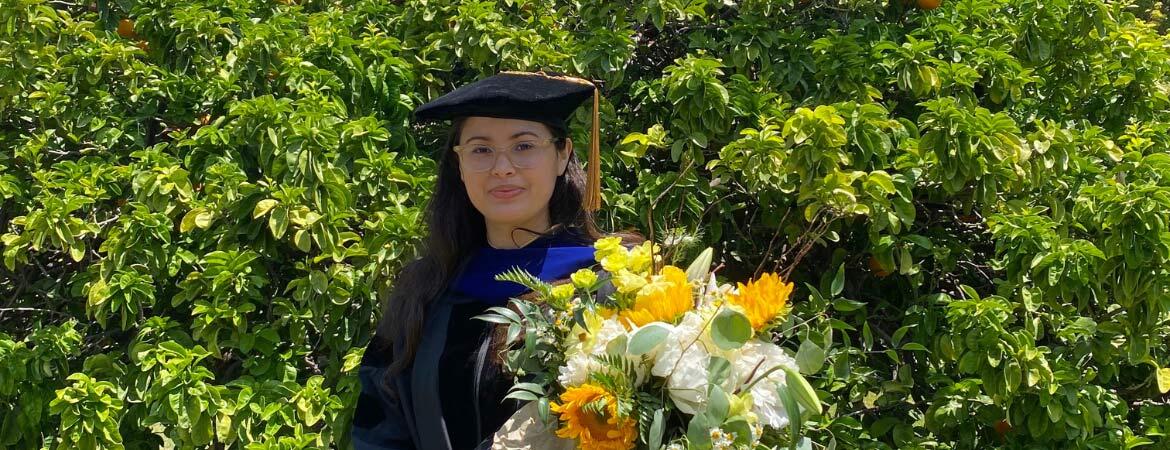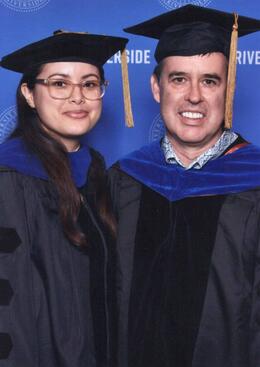
Zaira Jimenez just graduated with a Ph.D. specializing in special education. While she now holds the highest possible academic degree a student can obtain, Zaira never imagined she would go to college at all.
Like many students who grew up in low-funded schools, Zaira was never encouraged to pursue an education beyond high school. “My [high school] teacher recommended that as a Latina I should do something with my looks rather than continuing my education,” she said.
While she didn’t have an encouraging support system, Zaira was determined to go to college. That persistence paid off and she started her undergraduate education at UCR in 2008. Once she was at the university, it took her a while to settle in and find her bearings. “I did not feel prepared for UCR. I felt like I needed to catch up because there was so much I didn’t know,” Zaira said.
She eventually graduated with a B.A. in Sociology/Law and Society, then went on to work in the field of Applied Behavior Analysis (ABA). As an ABA technician, Zaira worked with children and their families and eventually decided she wanted to grow in the field so she went back to school to get her M.A. at UCR’s School of Education.
Zaira excelled in her master’s program and eventually became a graduate research assistant for Michael Solis, Associate Professor in Education, in her final year. Dr. Solis’ research focuses on reading interventions for students with reading difficulties in grades 4-12.
During her master’s program, Zaira was approached by Dr. Solis who suggested she continue her education beyond the master’s level.
“I had her in a master's level class. I noticed that she was exceptionally dedicated to her studies and that she also did a great job with the writing of her papers. I mentioned that to one of my colleagues (Dr. Rollanda O'Connor) who informed me that she had also observed these same attributes. Through that conversation we both agreed that she would be a great fit for pursuing a doctoral degree,” said Dr. Solis.
While she saw the Ph.D. program as an opportunity to continue learning how to mix her passion for the behavioral sciences and special education, Zaira was uncertain about taking this step because she didn’t have the emotional and financial support needed to do the four-year program.

“Dr. Solis asked me ‘what are some things you need to support your education?’, and that was something that no one had ever asked me before. He then came back and said he could actually fund me for all four years of the program. He was one of the first people to sit down and do the work for me,” Zaira said.
Dr. Solis was able to fund Zaira’s studies through a grant to develop a reading intervention for students with autism. Their research included working with student participants in local schools to implement reading interventions.
Throughout her Ph.D. program, Zaira co-authored four articles as part of Dr. Solis’ reading lab and also been a coauthor on 2 articles as part of a research team from the University of Denver. She was also awarded several grants and awards including a Hammill Institute Grant (2021), Outstanding Teaching Assistant Award (2021), and The Eady Summer Research Award (2019). The Eady Summer Research Award allowed her to begin the research that eventually led to her dissertation.
Post-graduation, Zaira is continuing to work in a postdoctoral position as project director for Dr. Solis’ study which is funded by the Institute of Education Sciences. The team is currently going into year-two of their study which will include working with schools and recruiting student participants.
While Zaira never imagined she would go to college, she now holds the title Dr. Jimenez after successfully completing her B.A., M.A., and Ph.D.
When asked what advice she has for students who are going through the same struggle she once endured, Zaira said it’s imperative to believe in themselves and do the work.
“Society and the media portray education as something that we can’t do, but you have to truly believe in yourself. Despite what those around you might say, always believe in yourself. It’s also important to pair this with doing the work. You have to knock on the first door, knock on that second door, and maybe even the third door.”